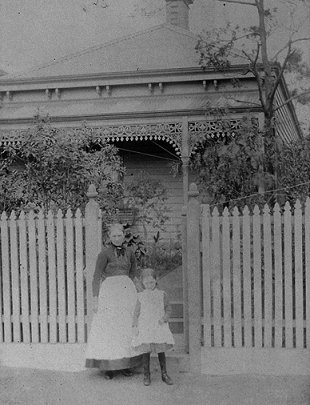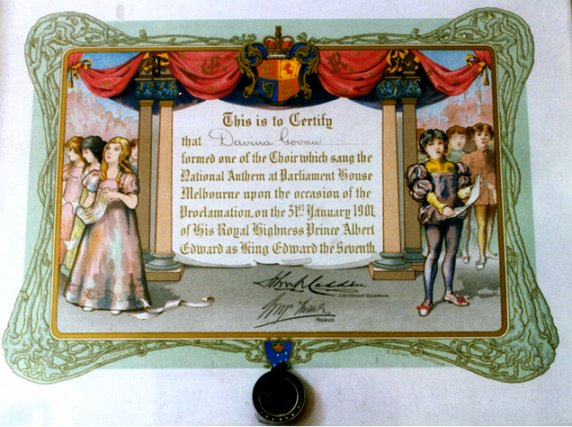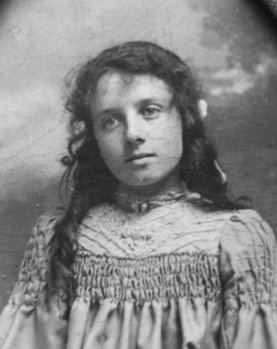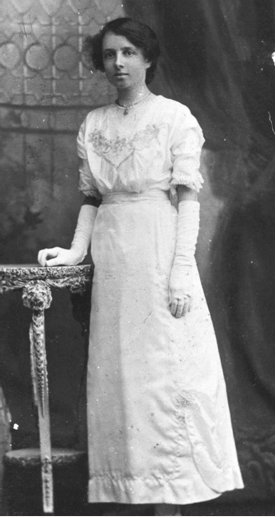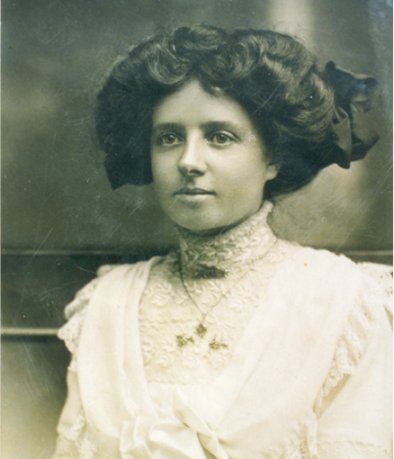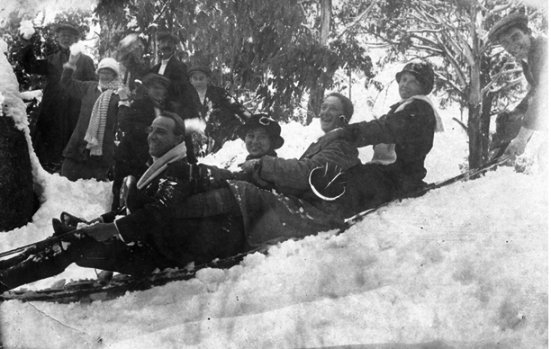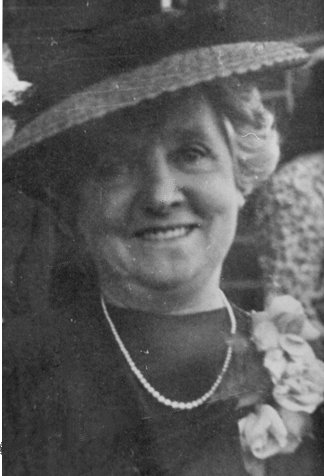|
My mother, Davina Jane Newman (but called Venie by many of her friends and my father), was the eleventh and last child in her family. She was born posthumously, her father having fallen into his father's disused blue stone quarry and drowning in the bottom before she was born. I understand that because my grandmother already had six children to bring up single handed (four children had died), she was offered an abortion by her doctor, but she turned it down. It is rather odd to realise that had she not done so, I would not be here to write this. | ||
|
| ||
|
In her youth Mum sang in a choir and there is a certificate to say she sang "upon the proclamation, on 31st January 1901, of His Royal Highness Prince Albert Edward as King Edward the Seventh". She also did dumb- bell training. I remember hearing Farve saying rather sadly one day that it was a pity that the things that attracted a man to a woman were often dropped after marriage. I wondered at the time if he was thinking of Mum even though I knew that, as a mother of a family, it is not always easy to maintain the same interests. | ||
|
| ||
|
At the time of her marriage, my mother was living in 21 Pilgrim Street, Footscray. I think that in the early days at the time of my great grandfather the family blue stone quarry had been quite a prosperous business. It had later been passed on to one of my grandfather's brothers. After awhile there was not the market for blue stone and the quarry was finally sold at a time when it was just about to become even more valuable again. I am not absolutely certain about these facts. I have only the vaguest memories and can't actually remember my mother ever speaking about it. I have the feeling though, that money was not in plentiful supply in the household in which my mother grew up. She lived in Footscray which, as a western suburb of Melbourne, was less prosperous than eastern suburbs. | ||
| ||
|
When my mother left school, which was quite early, she worked in a tailoring establishment. She called herself a "tailoress", but apart from darning, I cannot remember her doing much sewing. She took great pride, though, in her treadle sewing machine and, with all its little wooden drawers, it is a very clear memory to me. After Mum died Win acquired a framed photograph of Farve which was surrounded by charmingly designed embroidery worked by my mother with true lover's knots and snail or coral stitch done in greens. Also Mum had many lovely embroidered and crocheted things in her trousseau. All these things had been made by Mum, yet neither Win nor I have any memory of her ever doing any embroidery nor did she ever talk about it. This was a disappointment to Win as embroidery was one of her passionate interests and she would have appreciated being taught it by her mother and to have shared the interest with her. As the last child in the family I think Mum was very much loved, both by her brothers and sisters and by her mother. She certainly seemed to have been very close to her mother whom she greatly admired. I gather that she had a very Victorian, Presbyterian upbringing. All members of the family had their special jobs to perform. I seem to remember that one of my mother's jobs was to clean out the lavatory - a separate building at the end of the back garden. Sunday was a day on which no work should be done and it was a sin to even thread a needle. I think that my mother felt guilty about doing this all her life. The Victorian ethics and inhibitions certainly stayed with her and to a lesser extent we too were brought up in this manner. From quite early childhood we were taught to be "modest". That meant that you bathed behind locked doors and never talked about certain parts of the body (even armpits); that bodily functions were also not talked about so that menstruation came as a very nasty shock and sex and reproduction, if left to my mother, a completely closed book. My mother's mother, Eliza Ann Govan, nee Waldock died on 8th August 1925, which was my first birthday, so I never knew her, but it did mean that my birthday was also the anniversary of her death and therefore a day of mourning on which Mother, or Mum (Mummy when we were young) as we called her, went to visit her mother's grave. | ||
|
| ||
|
In height Mum was about five feet tall, or perhaps even a little less. When young she was slender as can be seen from the photographs of her but in old age she put on a bit of weight. She always wore strong, boned corsets. She loved to tell us that when she was young she had "nut-brown" hair. I, of course, don't remember this but the photos of her at that age show an abundance of dark hair. Even when she was old Mum had pretty hair. It was pure silver-white and it softly curled. Mum had a reddish-brown birth mark which stretched from her bottom lip across her chin. I never thought of it as a disfigurement, in fact didn't really notice it - it was just part of our Mum. Mum had lots of little sayings, one of which always made me smile was her "turning around". She would say, "..and I had to turn around and do such and such". It always created a picture in my mind of her spinning around and around. If we had been on holiday before leaving our rooms she used to tell us to "throw our eyes around" to make sure we had left nothing behind. I think that when she was young Mum must have had quite a sense of adventure because, before they were married, she and my father, rather surprisingly, used to go on holidays together on his motorbike into the Australian bush. Also there is a picture of them on their honeymoon having a ride on a toboggan in the snow at Mt. Buffalo. | ||
|
| ||
|
Before her marriage Mum put together a trousseau as was usual for girls in those times. I remember her saying that she gathered and hand made sufficient clothes and linen for her not to have to buy any for six years after she was married. What a very different attitude to today's when shopping for clothes is a major activity. I don't know whether it was because I was the fourth child and because Mum was too busy or because she was too reserved but I don't remember ever really talking, heart to heart talking, with her even when I became an adult. That she looked after us all very well is not in question. She was a good cook and thought carefully about the nutritional value of the food she prepared - rather before that really became an issue with most people. We were always very well clad and she was most particular about the quality of our clothes, but having said all this, I feel that I never really knew her or for that matter that she knew me. I think that this reticence to talk did not apply to everyone. She could have very lively conversations with her friends. Monday wash-day was a very work intensive day for Mum. In every other Australian house that I knew at that time there was a separate wash-house outside of the house, but in our house the washing was done in the kitchen. In one corner of the kitchen there was a bricked-in `copper' and next to it two wooden troughs which went right across one side of the kitchen. The `copper' was a large copper semi-sphere with a wood fire underneath it. First the fire had to be lit and kept going until the water in the `copper' was boiling. In it were the bed linen, tablecloths, serviettes and any other cotton or linen 'whites' bubbling away in soapy water to which washing soda had been added and possibly `blue'. While they were boiling they were poked about with a wooden stick. When they had boiled the correct length of time they were lifted across to the adjoining wooden troughs on the stick where they were thoroughly rinsed and then put through a hand ringer. Next they were loaded into a wicker basket and taken out to be hung on the line to dry. They were by no means as dry as clothes that have been through a spin drier and so must have been both heavy to carry and take a long time to dry. Tuesday was ironing day. In later years Farve bought a washing machine for Mum but she refused to learn to use it so when he retired from work Farve used it to do the washing. I understand from Helen that Mum yearned for a separate wash-house like everyone else had. Helen also tells me that the new washing machine was not easy to use and tended to `jump' around the room. It was very important to Mum that we all went to good private schools. I think she always felt conscious of her own lack of education. If we brought home friends who were not up to scratch she would be very disapproving. I don't think that she approved of any of our husbands. No one was really good enough for any of her daughters. She was very proud of us having an education, but that did not mean that she wanted it to go too far. She was very much against me becoming a teacher because she thought that, as such, I would remain an old maid. Both my parents, and especially Mum, had a very different attitude to their daughters' careers from what parents have today. It was still a girl's main aim to be married and anything that went before was relatively unimportant - certainly not in the realm of a sustainable career. Di became a secretary to my father. Win wanted to be a children's nurse but was not allowed to go out to work because Mum wanted her to stay at home to help in the house. For awhile, during the war and much to my mother's dislike, Win was called up to work in a kindergarten run for mothers who were on essential work but she injured her back during this time and had to leave. From then on Mum had her way and Win stayed at home to help with the housework. Eileen was allowed to train as a kindergarten teacher but whether this was seen as a career or as a useful preliminary to being a mother I do not know. What she wanted for me was to have a nice office job. I did a secretarial course at school and when I left I went into an office, to please her, but I disliked it so much that I signed myself up to do a teaching course very soon after. Although disappointed, she accepted this but was very upset when I went into residence at the school where I was a student teacher. In her world, the only reason a girl left home was to get married. She regarded it as a failure on her part that I left, whereas I just wanted to widen my experience and experience `life'. I was not unhappy at home. Mum had a particular hate and fear of alcohol. I expect that this was partly because of the way in which her father died - he had been drunk when he fell in the quarry - (I didn't know about this until long after Mum's death as it was not ever talked about). I know that at one time in Australia when there was a vote on Prohibition, banning alcohol, she voted for the ban. My father was a very moderate drinker, having a very occasional glass of wine with a meal, but although she accepted this, she didn't really like it. I suppose when I was young, corporal punishment was taken for granted. Mum's particular form of punishment was with what we called a 'switch'. This was a supple, green twig from the almond tree, stripped of leaves. It was used on our legs. I think I must have been a very naughty and annoying child and I remember on one occasion being chased round the garden and out the gate with the switch, although whether or not I was caught I can't remember. Nor do I remember the offence I had committed. Mum had always kept in touch with the friends she made at Sunday School when she was young and these friends, called 'the girls' used to meet every month in each other's homes. When it was Mum's turn the whole house had to be cleaned from floor to ceiling (it was always spotless anyway). We used to joke about the fact that she even dusted the top of her wardrobe. The afternoon tea that was provided for 'the girls' was always a terrific spread of sandwiches, scones (a great speciality of Mum's) and cakes and I have the impression that all 'the girls' used to try and outdo each other on this score. Later on, when they all had more money and more sense, they used to go to a restaurant instead of each other's homes. Although Mum had six brothers and sisters, she didn't keep in touch with all of them to the same extent. She had particular favourites among them. Uncle Ted was one of her favourites and his wife Ann. If she was feeling unhappy and misunderstood she often went to visit Uncle Ted to pour out all her troubles to him and Aunty Ann. Her eldest sister Annie was also a great friend and so was her sister Evie. The rest of the family remained living in Footscray and this was neither a desirable nor easy journey to make except on some special occasion. I don't remember Mum ever going for a walk. About the longest distance she ever walked, in my memory, was to the Presbyterian Church that she, and most of us as children, attended. I think it was less than a quarter of a mile away. It is strange really, considering the fact that Farve was so keen on walking, that she didn't seem to like it. In fact in many ways my parents were opposites; she was an early-to-bed person, he seldom retired before midnight; he liked a good bawdy joke and she was very unamused by them; he liked long intellectual discussions with people with ideas and she felt very insecure in this society; he liked entertaining his friends to parties at home and although she provided for these for years, in the end she refused to be part of them and would retire to bed. In spite of all this Mum and Farve rubbed along quite well together. They seemed to agree pretty well about the bringing up of their children and I certainly don't remember any rows. In fact it used to be a boast of Mum's that they had never had an argument. Going to the Presbyterian Church was a very important part of Mum's life and increasingly so as she grew older. Every weekday morning, when I was a child, my mother would get up to get the breakfasts and lunches for Farve and the family. Mum and Farve would be up at sixish and while Farve went through his totally regular and predictable going-to-the-toilet-getting-shaved-and-dressed routine, Mum would make cooked breakfasts for us all, including squeezed orange juice and toast while she cut sandwiches etc. for lunches for six people. (One of my very clear memories is the sound of the burnt toast being scraped outside the kitchen door in the morning.) The lunches she made while doing all these other things were really good. Always different, interesting and often with little surprises in them. With all this to do and no pop-up toaster, who can wonder that the toast got burnt? When she was young, Mum collected post cards. Friends and relatives used to send them to her to add to her collection. There was a great variety of cards, from simple black and white scenes to velvety textured raised pictures and one, I remember had a bird which you could move. These were all kept in a large book and were very precious to Mum and to us. If we were ill in bed, we were allowed as a special treat to carefully hold the book and look at its wonderful pictures. Long after her death I visited Win who had the book. We decided to take the postcards out, one by one, and read the messages on the backs of them. I don't think it had ever occurred to any of us ever to do such a thing before and we felt a bit guilty doing it, but we wondered if it would help us to know our mother better. It was very interesting. There were quite a lot of cards from her sister Annie, who obviously held her in great affection; there were cards (black and white) from Farve describing trips he was on and the scenery, in some detail, and one card from a girl friend who teased her about 'Syd' and warned her not to play about with him. Whenever any of us were sick, no one could have been given better or more attention than our mother gave us. When any of us had a chest infection, a favourite remedy was a mustard plaster. They seemed to do the trick too. Another speciality was an egg flip. This was given as a nourishing food to help recovery or just as an extra. Mum was proud of having brought up five children and considered that the job she had done was a mammoth task and completed her obligation. She made it quite clear to us that when we left home to get married that that was that. We were to take our beds with us, and, so to speak, lie on them. We were not to come running back to her, nor would she look after our children. It seems strange to me now, for I would never have done the same to my children, how much for granted we took this, nor did we resent it. I think that Farve was pretty generous with the money he gave her both for housekeeping and dress allowance, but Mum always felt that she was dependent and that she would like something she could call her own. When money became a bit easier for Farve he bought a house in South Melbourne which had belonged to his father and gave it to Mum. She had become a property owner! The house was let and the rent was hers but I am told that she did not like being a landlady. Not many years later property began to increase in value quite considerably and Mum had the opportunity of selling it at quite a profit. Farve was not keen on the idea as he had some idea of living in the house at a later stage in their lives (it was in a wonderful position near the Fitzroy Gardens and only a walking distance into the city), but the house was hers to do with as she liked. It was sold. She then had a very nice sum of money in her bank book which I think she very much appreciated having and liked to look at. She left it in her will to her five daughters. | ||
|
| ||
|
Most of her married life, Mum had some kind of help in the house. When I was very young we had someone living in, but I was too young at the time and have no memory of who was there. I can remember when my cousin, Evie, came to live with us, to help Mum, but not very well. The one I can remember is Miss Regal, who came on Thursdays to clean the house and to look after any children at home. I rather think she was a 'treasure'. Mum used Miss Regal's day to have a day off and always went out for the day by herself. When help became increasingly difficult to get, my sister Win was kept at home to help in the house. She received a very small amount of money for the privilege and I am sure it was a pretty thankless job. She used to make all our beds (and beds really took some making in those days. The mattress had to be turned and the kapok filling smoothed out before the sheets and blankets were put on individually and tucked in). When I visited my old home from England many years later, a firm called The Dutch Cleaners came once a week to clean. Mum used to go to great efforts before they came, putting chairs up on tables and generally making sure it was all clean and tidy for them to clean and tidy!! As we grew up, we considered it a privilege to be able to take Mum her breakfast in bed on a Sunday morning. Mum's cup of tea had to be made "just so". The pot had to be warmed and the correct amount of tea put in before the boiling water then the cup had to be warmed and one spoonful of sugar put in and enough milk to just cover the sugar before the tea was poured in. I don't think that Mum was a very happy person. I think that she must have suffered from winter depression or what is now recognised as Seasonal Affected Disorder (SAD). There was no name for it then, nor recognition of it being a medical and treatable condition. Win, as the one of us at home with Mum, used to dread the winter months because of these deep depressions. To my shame, I was unaware of it. I have the feeling that life didn't come up to Mum's expectations. When I visited Australia for my parent's Golden Wedding anniversary in July 1966, she said to me that by the time you had been married for fifty years, it was time you were not here. All her brothers and sisters had died by then, and as it happened, she was soon to join them. Shortly after the anniversary celebrations were over she became ill. We were not very concerned about it, thinking that she had some kind of chill, but she died suddenly of what was called cardiac asthma. It was a terrible shock to us all. |

